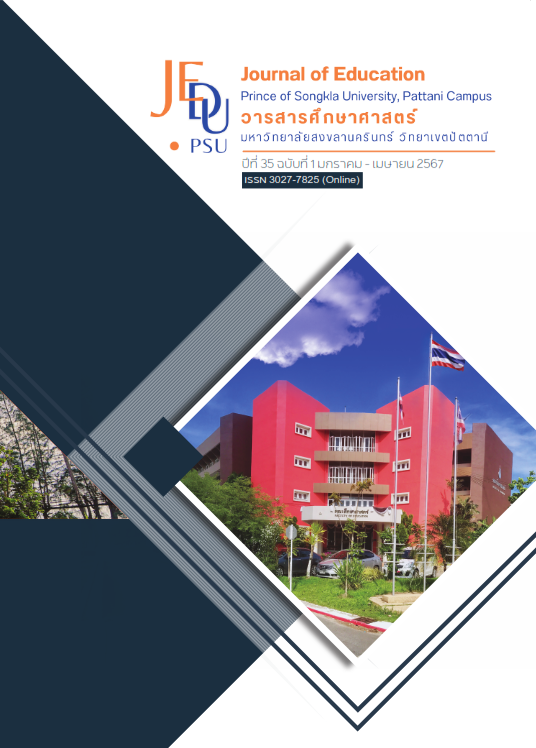ปัจจัยที่สัมพันธ์ต่อสุขภาพจิตของนักศึกษามหาวิทยาลัยราชภัฏ ในช่วงการเรียนรู้ยุควิถีชีวิตปกติใหม่
Main Article Content
บทคัดย่อ
การวิจัยนี้มีวัตถุประสงค์เพื่อประเมินดัชนีชี้วัดสุขภาพจิต เพื่อหาปัจจัยที่สัมพันธ์ต่อสุขภาพจิตของนักศึกษาและเพื่อทราบผลกระทบถึงนโยบายการจัดการเรียนการสอนของมหาวิทยาลัยที่นามาใช้กับนักศึกษา กลุ่มตัวอย่าง จำนวน 441 คน โดยการสุ่มแบบหลายขั้นตอน เครื่องมือที่ใช้เป็นแบบสอบถาม วิเคราะห์ข้อมูลด้วยสถิติเชิงพรรณนา วิเคราะห์ค่าสหสัมพันธ์ และการวิเคราะห์ถดถอยพหุคูณแบบขั้นตอน ข้อมูลเชิงคุณภาพใช้การวิเคราะห์แบ่งกลุ่ม และการวิเคราะห์เชิงเนื้อหา
ผลการวิจัยพบว่า 1) นักศึกษาส่วนใหญ่มีสุขภาพจิตดีกว่าคนทั่วไปคิดเป็นร้อยละ 94.77 รองลงมาคือมีสุขภาพจิตเท่ากับคนทั่วไปคิดเป็นร้อยละ 4.75 และเป็นผู้ที่มีสุขภาพจิตต่ำกว่าคนทั่วไปน้อยสุด คิดเป็นร้อยละ 0.48 ตามลำดับ 2) ตัวแปรภายในที่มีความสัมพันธ์ทางบวกกับสุขภาพจิตดีกว่าคนทั่วไปคือ นักศึกษาชั้นปีที่ 3 ของคณะครุศาสตร์ ตัวแปรอายุ และพบว่าตัวแปรนักศึกษาชั้นปีที่ 1 ของคณะพยาบาลศาสตร์มีความสัมพันธ์ทางลบกับสุขภาพจิตดีกว่าคนทั่วไป 3) ความรู้สึกในทางที่ดีจากนโยบายคือ ได้คลายเครียด รู้สึกได้พักผ่อนมากขึ้น ได้นอนเพิ่มมากขึ้น ได้อยู่กับครอบครัวมากขึ้น มีเวลาทำกิจกรรมอย่างอื่นมากขึ้น ไม่ต้องพบผู้คนมาก ทำให้ลดการเสี่ยง ประหยัดค่าใช้จ่าย รู้สึกเห็นใจพ่อกับแม่มากขึ้น ได้เรียนรู้สิ่งใหม่ๆ ไม่ต้องรีบตื่นไปเรียน เรียนได้ทุกที่ทุกเวลา มีเวลาทำงานอดิเรกมากขึ้น ไม่ต้องเดินทางบ่อย และตื่นนอนช้าได้ 4) ความรู้สึกในทางที่ไม่ดีคือ ห่างบ้าน เสี่ยงติดโรค ไม่ได้ออกไปทำกิจกรรมนอกที่พัก ต้องสวมหน้ากากตลอดเวลา โมโหง่ายขึ้น เหนื่อยกับการทำงาน เวลาว่างน้อยลง กินนอนไม่ตรงเวลา ทำอะไรก็ยากขึ้น มีความกังวล และไม่ค่อยมีเพื่อน
Article Details

อนุญาตภายใต้เงื่อนไข Creative Commons Attribution-NonCommercial 4.0 International License.
เอกสารอ้างอิง
Attygalle, U. R., Perera, H., & Jayamanne, B. D. W. (2017). Mental health literacy in adolescents: ability to recognize problems, helpful interventions and outcomes. Child and Adolescent Psychiatry and Mental Health, 11(1), 38.
Campos, L., Dias, P., Palha, F., Duarte, A., & Veiga, E. (2016). Development and Psychometric Properties of a New Questionnaire for Assessing Mental Health Literacy in Young People. Universitas Psychologica, 15(2), 61-72.
Coles, M. E., Ravid, A., Gibb, B., George-Denn, D., Bronstein, L. R., & McLeod, S. (2016). Adolescent Mental Health Literacy: Young People's Knowledge of Depression and Social Anxiety Disorder. Journal of Adolescent Health, 58(1), 57-62.
Dias, P., Campos, L., Almeida, H., & Palha, F. (2018). Mental Health Literacy in Young Adults: Adaptation and Psychometric Properties of the Mental Health Literacy Questionnaire. International Journal of Environmental Research and Public Health, 15(7), 1318.
Doyle, E., O’Sullivan, S., Nearchou, F., & Hennessy, E. (2017). An exploration of mental health literacy in relation to depression in secondary school pupils. Journal of Education and Training, 4(2), 1-13.
Inchaithep, S., Puasiri, S., Phansawat, M., Thummhol, P., & Praruat, W. (2018). Developing indicators of mental health literacy for the general public. Journal of Boromarajonani College of Nursing, Uttaradit, 10(2), 97-109. [In Thai]
Jorm, A. F. (2000). Mental health literacy. Public knowledge and beliefs about mental disorders. The British Journal of Psychiatry, 177, 396-401.
Jorm, A. F., Barney, L. J., Christensen, H., Highet, N. J., Kelly, C. M., & Kitchener, B. A. (2006). Research on mental health literacy: what we know and what we still need to know. Australian and New Zealand Journal of Psychiatry, 40(1), 3-5.
Jorm, A. F., Korten, A. E., Jacomb, P. A., Christensen, H., Rodgers, B., & Pollitt, P. (1997). “Mental health literacy”: a survey of the public's ability to recognize mental disorders and their beliefs about the effectiveness of treatment. Medical Journal of Australia, 166(4), 182-186.
Metcalfe, J., & Mischel, W. (1999). A hot/cool-system analysis of delay of gratification: Dynamics of willpower. Psychological Review. 106(1), 3-19.
Melas, P. A., Tartani, E., Forsner, T., Edhborg, M., & Forsell, Y. (2013). Mental health literacy about depression and schizophrenia among adolescents in Sweden. European Psychiatry, 28(7), 404-411.
O’Connor, M., & Casey, L. (2015). The Mental Health Literacy Scale (MHLS): A new scale-based measure of mental health literacy. Psychiatry Research, 229(1-2), 511-516.
O’Connor, M., Casey, L., & Clough, B. (2014). Measuring mental health literacy--a review of scale-based measures. Journal of Mental Health, 23(4), 197-204.
Rice, F., Eyre, O., Riglin, L., & Potter, R. (2017). Adolescent depression and the treatment gap. The Lancet Psychiatry, 4(2), 86-87.
Saitarnvanitkul, M., Aekwarangkun, S., & Yumyuang, N. (2021). Situations, Needs and Guidelines for Mental Health and Psychiatric Service Operations for Students. Walailak University Journal of Naval Medicine, 48(1), 37-52. [In Thai]
Uonlam, T., & Panphoklang, S. (2021). Mental health and stress power of students of the Faculty of Nursing, Rangsit University. Journal of Health and Nursing Research, 37(1), 240-251. [In Thai]


